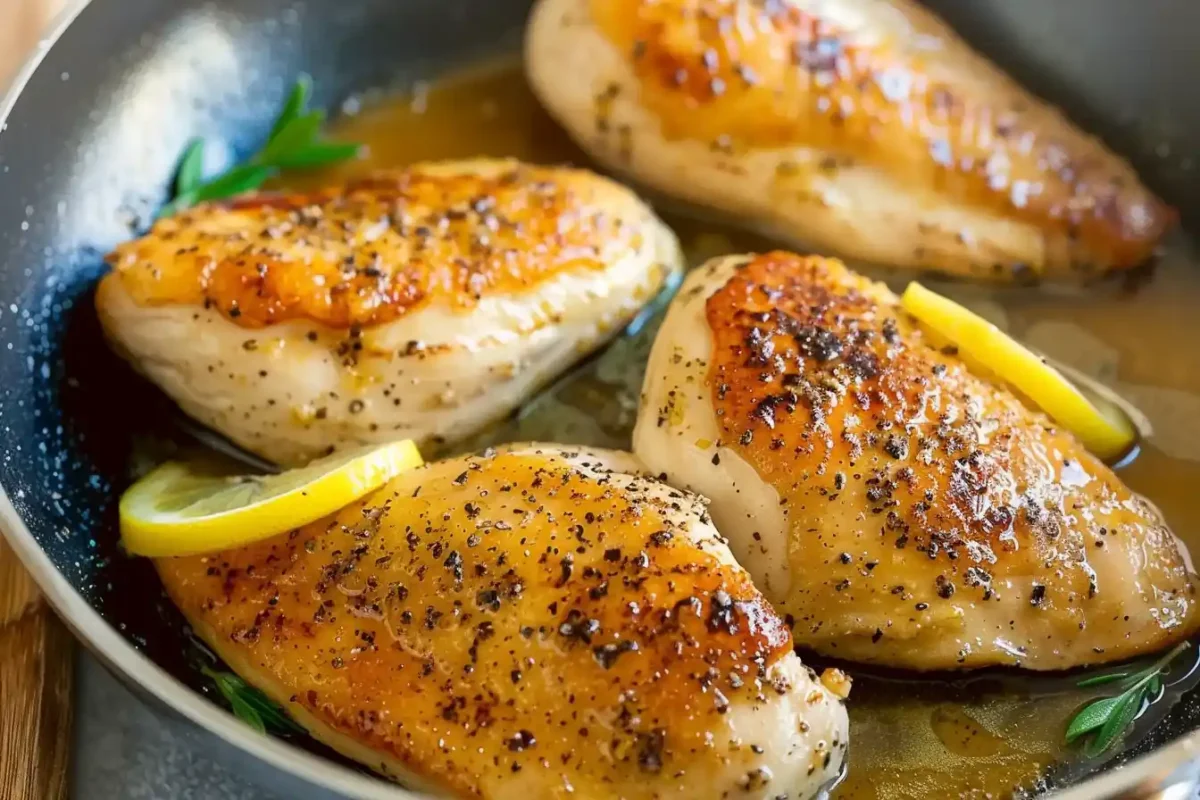The sizzle of chicken in a hot pan, the zesty aroma of fresh lemon, and the promise of a meal that’s both comforting and refreshing—lemon chicken is truly magical. This timeless dish is simple yet sophisticated, perfect for weeknight dinners or weekend entertaining. While many fear dry or bland chicken, this recipe guarantees tender, juicy results bursting with bright citrus flavors.
Lemon chicken strikes the perfect balance: the chicken’s natural sweetness pairs with the tart, vibrant lemon, creating a dish that’s both satisfying and light. Whether you’re a beginner or a seasoned cook, this recipe deserves a permanent spot in your collection.
In this guide, we’ll cover everything you need to create the perfect lemon chicken—from selecting ingredients to mastering techniques. Get ready to turn ordinary chicken into an extraordinary meal that will have everyone asking for seconds!
Jump to:
Ingredients Overview
The beauty of this recipe lies partly in its simplicity – you don’t need exotic ingredients or special equipment to create something remarkable. However, the quality of each component matters significantly.
The Chicken
For this recipe, boneless, skinless chicken breasts work wonderfully, but chicken thighs can be an excellent alternative. Thighs tend to be more forgiving (less prone to drying out) and often more flavorful, though slightly higher in calories.
When selecting chicken:
- Look for organic or free-range options when possible
- Choose pieces of similar size for even cooking
- If using breasts, consider butterflying or pounding them to an even thickness
- Pat dry before cooking to encourage browning
The Lemons
Since lemons star in this dish, their quality is paramount:
- Choose bright yellow lemons that feel heavy for their size
- Organic lemons are preferable since you’ll be using the zest
- Meyer lemons offer a slightly sweeter profile if available
- You’ll need both zest and juice, so plan for 2-3 lemons depending on size

Herbs and Seasonings
The following will elevate your lemon chicken from good to memorable:
- Fresh garlic (2-3 cloves, minced)
- Fresh herbs (thyme, oregano, or rosemary work beautifully)
- High-quality olive oil
- Sea salt and freshly ground black pepper
- Optional: red pepper flakes for heat
- Optional: Dijon mustard (1 tablespoon) for depth
Additional Pantry Staples
Complete your ingredient list with:
- Chicken broth (1 cup)
- Butter (2 tablespoons)
- Flour (1 tablespoon) for thickening, if desired
- Honey or sugar (1 teaspoon) to balance acidity, if needed
before beginning will streamline your cooking process and help ensure success.
Easy Lemon Chicken Recipe: Step-by-Step
Now, let’s put everything together with this foolproof recipe.
Ingredients:
- 4 boneless, skinless chicken breasts (about 2 pounds)
- 2 tablespoons olive oil
- 2 tablespoons butter
- 4 cloves garlic, minced
- 2 lemons (zest from both, juice from both)
- 1 cup chicken broth
- 2 tablespoons fresh herbs (thyme, rosemary, or oregano), chopped
- 1 tablespoon flour (optional, for thickening)
- 1 teaspoon honey (optional)
- Salt and freshly ground black pepper
- Fresh parsley for garnish
Instructions:
- Prepare the chicken: Pound chicken breasts to even thickness (about ¾ inch). Pat dry with paper towels and season generously with salt and pepper on both sides.
- Heat the pan: In a large skillet, heat olive oil over medium-high heat until shimmering.
- Sear the chicken: Place chicken in the hot pan without crowding (work in batches if necessary). Cook for 5-6 minutes on the first side until golden brown. Flip and cook for another 4-5 minutes until internal temperature reaches 165°F (74°C). Remove chicken to a plate and tent with foil.
- Create the sauce base: In the same pan, reduce heat to medium and add butter. Once melted, add minced garlic and cook for 30 seconds until fragrant, being careful not to burn it.
- Build the sauce: Add lemon zest, lemon juice, and chicken broth to the pan, scraping up any browned bits from the bottom. Bring to a simmer.
- Thicken (optional): For a slightly thicker sauce, sprinkle in 1 tablespoon of flour while whisking constantly, or make a slurry by mixing the flour with a little cold water before adding.
- Add herbs: Stir in fresh herbs and simmer for 2-3 minutes until the sauce reduces slightly. Taste and adjust seasonings, adding honey if the sauce is too tart.
- Return chicken: Place chicken back in the pan, spooning sauce over the top. Simmer gently for 1-2 minutes to rewarm the chicken and allow it to absorb some of the sauce.
- Serve: Transfer chicken to plates and spoon additional sauce over the top. Garnish with fresh herbs and lemon slices.
Visual cues for doneness include firm, opaque meat and clear (not pink) juices. Always verify with a thermometer that chicken has reached 165°F (74°C) at its thickest point.
Once you’ve mastered the basic recipe, experiment with these delicious variations:
Variations to Try
1. Mediterranean Lemon Chicken with Olives and Herbs
Add ½ cup each of pitted kalamata olives and cherry tomatoes to the sauce, along with 1 tablespoon of capers. Increase the herbs, focusing on oregano and thyme. Finish with crumbled feta cheese for a Mediterranean-inspired dish.

2. Creamy Lemon Chicken with Garlic
After removing the chicken, add ½ cup of heavy cream to the sauce and reduce until slightly thickened. The result is a velvety, indulgent sauce that still maintains the bright lemon flavor.
3. Honey Lemon Chicken for a Sweeter Twist
Increase the honey to 2 tablespoons and add 1 tablespoon of soy sauce for an Asian-inspired sweet and tangy dish. Garnish with sesame seeds and sliced green onions.
4. Lemon Chicken Piccata
Add 2 tablespoons of capers and 2 tablespoons of white wine to the sauce. Dredge the chicken lightly in flour before searing for a traditional piccata preparation.
5. Grilled Lemon Chicken
Marinate chicken for 2-4 hours in lemon juice, zest, olive oil, garlic, and herbs, then grill instead of pan-searing. Reduce the remaining marinade (never use marinade that’s contacted raw chicken without boiling first) to create a sauce.
If you’re looking for a time-saving alternative, you can also use store-bought rotisserie chicken. Learn more about using rotisserie chicken in soups for other quick and delicious meal ideas.
Perfect Pairings and Serving Suggestions
Lemon chicken’s versatility extends to what you can serve alongside it. Here are some perfect pairings:
Grain Accompaniments:
- Fluffy couscous or quinoa to absorb the sauce
- Creamy risotto with Parmesan
- Crusty bread for sopping up every last bit of sauce
- Simple pasta tossed with olive oil and herbs
Vegetable Sides:
- Roasted asparagus or green beans
- Sautéed spinach with garlic
- Greek salad with cucumber, tomato, and feta
- Steamed broccoli with lemon butter
Wine Pairings:
- Crisp, unoaked Chardonnay
- Sauvignon Blanc
- Pinot Grigio
- Light Pinot Noir for red wine lovers
Complete Meal Ideas:
| Occasion | Main | Side 1 | Side 2 | Dessert |
|---|---|---|---|---|
| Weeknight Dinner | Basic Lemon Chicken | Steamed Rice | Roasted Broccoli | Fresh Berries |
| Weekend Gathering | Mediterranean Variation | Orzo Pasta | Greek Salad | Baklava |
| Date Night | Creamy Lemon Chicken | Asparagus | Crusty Bread | Lemon Sorbet |
| Summer BBQ | Grilled Lemon Chicken | Corn on the Cob | Potato Salad | Watermelon |
Tips from Professional Chefs
Elevate your lemon chicken with these professional insights:
“The real secret to outstanding lemon chicken is building layers of flavor. Use lemon three ways: zest in the seasoning, juice in the sauce, and thin slices as garnish.” – Chef Thomas Keller
Balancing Flavors:
- If your sauce is too acidic, add a touch more honey or a pat of butter
- If it’s too bland, a pinch of salt or a few drops of fresh lemon juice can brighten it
- For deeper flavor, add a splash of white wine to the sauce
- A pinch of red pepper flakes adds complexity without noticeable heat
Common Mistakes to Avoid:
- Overcrowding the pan, which prevents proper browning
- Cooking chicken straight from the refrigerator
- Turning the chicken too early (wait for it to release naturally)
- Overcooking – use a thermometer and remember carryover cooking will continue after removing from heat
Restaurant-Quality Presentation:
- Slice chicken on a bias before serving
- Spoon sauce over the center, allowing it to pool slightly
- Add a fresh herb garnish at the last moment
- Consider a light dusting of lemon zest or flaky sea salt as a finishing touch
Love the bright citrus flavors in this lemon chicken? For a creamy, indulgent twist on chicken recipes, try our Marry Me Chicken Soup – it’s named for its reputation of being so delicious it might just lead to a proposal
Storing and Reheating
Lemon chicken makes excellent leftovers when stored properly:
Storage Guidelines:
- Refrigerate within two hours of cooking
- Store in airtight containers for up to 3 days
- Keep chicken and sauce together to prevent drying out
Freezing Instructions:
- Cool completely before freezing
- Freeze in portion-sized containers for up to 2 months
- Thaw overnight in the refrigerator before reheating
Reheating Methods:
- Stovetop: Gently rewarm in a covered skillet with a splash of water or broth
- Microwave: Heat at 70% power in 30-second intervals, covering to retain moisture
- Oven: Place in a covered baking dish at 325°F (165°C) until warmed through
For best results, reheat only until just warm (165°F/74°C) – overheating will toughen the chicken.
Reader Questions and Answers
Can I use bottled lemon juice?
While fresh is significantly better, bottled juice works in a pinch. However, you’ll miss the brightness of fresh juice and won’t have access to zest, which adds considerable flavor.
What if I don’t have fresh herbs?
Dried herbs can substitute at a ratio of 1 teaspoon dried for 1 tablespoon fresh. Add dried herbs earlier in the cooking process to allow time for rehydration.
Can I make this with bone-in chicken?
Absolutely! Bone-in pieces require longer cooking times (about 25-30 minutes total) and benefit from finishing in a 375°F (190°C) oven after searing.
How do I prevent my sauce from breaking or becoming greasy?
Maintain a gentle simmer rather than a rolling boil. If the sauce does break, a quick whisk with a teaspoon of cold water can often rescue it.
Conclusion Easy Lemon Chicken Recipe
Master this easy lemon chicken recipe for a dish that’s both simple and sophisticated. The bright, zesty flavors of fresh lemons paired with tender chicken make it perfect for casual dinners or special occasions. With minimal ingredients and straightforward techniques, it’s adaptable to suit any taste or dietary need.
Final Thoughts
This recipe bridges everyday cooking and gourmet dining, offering clean, vibrant flavors that appeal to all. As you experiment, you’ll create your own signature twist, turning it into a cherished family tradition.
Call to Action
Try this timeless recipe today! Share your lemon chicken adventures—photos, modifications, or success stories—in the comments. Your insights might inspire others to create something new. Save this recipe for a reliable, impressive dish that always delights!

